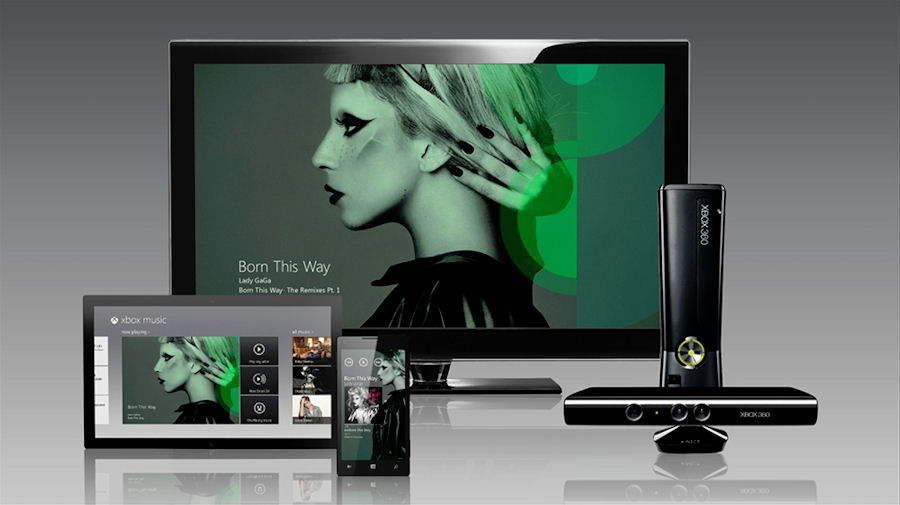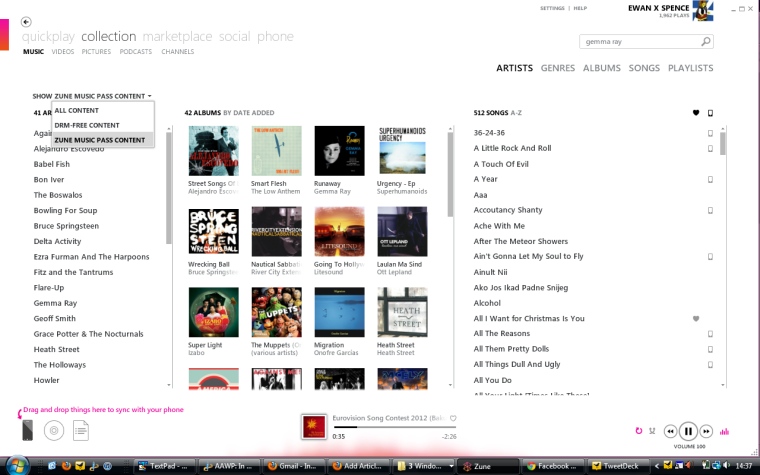Let's start with the existing music service from Microsoft. Pretty much anything named Zune will be renamed as Xbox Music going forward (even the Twitter account), so new Windows Phone 8 handsets will ship with the Xbox Music store included, while Windows 8 tablets will have Xbox Music as a media player.
Anything already out there simply gets a name change, where appropriate, and the same level of service continues. The Zune Music Pass will simply become the Xbox Music Pass. The subscription service that many are using (including some of us here at AAWP) will continue to be available, and will continue to allow you to download and listen to the music from the Xbox collection.
The same collection of music will be available to the existing clients as the clients that will be coming to Windows 8 and Windows Phone 8, and alongside the subscription model you will still be able to purchase music from the store. What existing users will not get is access to the new features of the Xbox Music Pass, such as cloud connectivity and the streaming service.

While there was the potential for confusion in the announcement, the idea that the service would simply be switched off for existing users was never going to happen. Thankfully Microsoft have emailed Zune Pass users to let them know of the (lack of) changes. But what's more intriguing for me, now I've had a chance to sit down and think, is how big a play this is for Microsoft, and how much of a win it actually is.
I've written before about the importance of music on a smartphone. Nokia made a huge play on their Windows Phone debut around Nokia Music's Mix Radio, which provided a free streaming radio service out the box at no extra cost to the consumer. While it was very much to mainstream tastes, with none of the customisation that services like Pandora or Last.FM can offer, it was a well received application, and provided Nokia a strong selling point.
The Xbox Music Pass is going to be an even stronger selling point. Yes it's an additional cost, and many early adopters will already have decided where their ten dollars (or ten pounds) a month is going to go to get their music, be it Spotify, Pandora, or elsewhere. And some of those may make the jump - but that's not the target audience. The target audience are people coming to the Windows 8 vision for the first time, who are looking for something different, who don't follow the online gossip and tech columns and may not have seriously considered the subscription services out there.
Just as Nokia found with Mix Radio, I'd expect that having the Xbox Music Pass described to them in-store is going to be a powerful selling point. "Why get one album a month when, for the same cost, you can access an entire catalogue?" It's a compelling pitch, and one that is more easily believed coming from a company with the scale of Microsoft when compared to numerous music based startups.
As a standalone service, offering both subscription downloads and streaming music, the Xbox Music Pass is pretty attractive. Given that the cost is comparable to the Zune Pass I've been using for the last twelve months I can say that in practice it's always felt great value for money. Even without the extra services, I'd be recommending people to look at this service - but when you look at everything the Xbox Music Pass has to offer, the recommendation is going to be stronger.
Of course, it does involve a certain buy-in by the consumer to the Microsoft ecosystem, just as you do with Apple's OS X and iOS hardware (and to a certain extent also the Android system), but this is Microsoft's plan - Windows 8, Xbox 360, Windows Phone 8, and Surface RT, all working together. On their own, each system works well, but start building up a home ecosystem, and everything is hopefully going to be more cohesive.
On a smaller scale, that's exactly what Xbox Music does. It works on a single device, but with the cloud storage, scan-and-match, and syncing across multiple devices it's not only a good example of the Windows 8 world, but it's also a practical example of the connected nature that people can understand - after all music is universal, and a musical world such as Xbox Music Pass is as universal as it gets in the current world of labels, contracts, negotiations, and territories.
Which leads me to one little curiosity around the Xbox Music Pass. Before the launch of the iPhone 5, there were strong indications that Apple was looking to put together its own Pandora-like audio service. Whether it failed to reach an agreement with all the labels, or it decided against a launch at this moment in time, is immaterial. Microsoft have beaten Apple to the punch in shipping this as a default option on their smartphones.

The Xbox Music Pass is an easy deal to explain, and I would expect it to play a strong role in the marketing of Windows Phone 8 and the other Microsoft systems. At the same time, I was expecting more to be made of the subscription service when it was called Zune. Microsoft have a killer feature here - one that entire companies are being built around - but they need to be clear in their message to the world. The confusion over the change from Zune Pass to the Xbox Music Pass does not bode well in that respect.
Consumers need to hear clear, coherent, and simple messages with the launch of new products. Microsoft are going to be launching a lot of new products and services over the next few weeks. Let's hope they can keep the innovation high and give a clear message to the media and the public.
